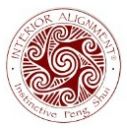Feng Shui
Feng Shui is the art and science of maximizing the potential of any environment to the specific needs of its occupants for successful, healthy and empowered living. Feng Shui is not a belief system or religion but a time honored, environmental system for successful living. Feng Shui literally translates as wind and water, referencing the quality of these elements as they move through our environments. We offer a practical and pragmatic approach to our services using the principles of the Form and Compass schools of Feng Shui.

It is our intent to present an honest introduction to a very beautiful, complex subject and to dispel popular myths and misconceptions attributed to this ancient and efficient system of environment management. There are many great books on this subject and many schools or disciplines of Feng shui in practice around the world. Our favorites are Feng Shui That Makes Sense, by Cathleen McCandless and Feng Shui For The Soul and Sacred Space by Denise Linn.
I have worked professionally with Scott on several interior design projects. Each of our collaborations provided me yet another opportunity to witness just how effective he is and how closely he works with his clients. I quickly found Scott’s understanding of the building process and his ability to keep things on track, coupled with his innate ability to communicate as a member of a team, to be just the start of his strengths. His attention to detail and explanation of the principles of Feng Shui through the process was invaluable. I would recommend him to anyone interested in significantly improving their personal and/or professional self.
– Dianne Sheridan, Designer, Dianne Sheridan Designs
Yin and Yang
Form School Feng Shui

Compass School Feng Shui

The Chinese Compass was oriented to be read from the South due to the importance of the Sun in sustaining life. If we look to the placement of elements in the Pa Kua, an eight sided symbol referencing 9 the nine directions and also known as Bagua, we can easily understand the logic in their placement:
The energy of the four directions evolved into 5 elements (due to the importance of metal in society) and assigned to 9 areas of the Pa Kua Compass, incorporating the eight trigrams of the I Ching to the eight outer compass points. The I Ching, also known as The Book Of Changes, is an ancient Chinese philosophical text illustrating a system of cause and effect represented through 8 trigrams (sets of 3 lines) and 64 hexagrams (sets of 6 lines).
Who Benefits from Feng Shui?

If our environment is stressful, our ability to enjoy a meal, perform our duties or sleep well is compromised. We make a multitude of decisions daily to maximize our potential for comfort and safety, from the lanes we chose to drive in on the freeway, where we prefer to sit in a restaurant, how we face another individual during a business meeting, etc.
These are not random choices but directly relate to your basic instincts for survival. When a space feels comfortable and inviting, it’s because there is harmony and balance which supports the activity within.
– Garret M., Rancho Santa Fe, CA

